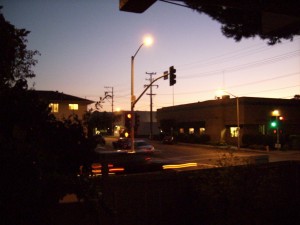Yesterday, because of the holiday, CalTrain was running on the Sunday schedule. I had taken CalTrain to Millbrae, transferred to BART and took BART across the bay to Berkeley, where I went to some used bookstores and then went to the Berkeley Sacred Harp singing in the evening. But CalTrain stopped running early, so when I finally got back to Millbrae I had to go down and take the 391 bus to San Mateo.
As my friend E has pointed out, many of the people who ride buses are what E calls “the working poor,” people working low wage jobs who maybe can’t afford a car. Last night, there were maybe ten people on the 391 bus: an older white guy who hadn’t shaved recently, a teenaged black couple who were totally absorbed in each other, a tall black man who was neatly dressed, and several other people who could easily have fit the description of “working poor.”
The tall black man sat just behind me. “Praise God, God is good,” he chanted sotto voce. “God is my anchor, all power to him.” At first I thought he was singing, and maybe had come from a prayer meeting or hymn sing; I had just come from singing white gospel music, so it was a natural thought for me to have.
A small man with brown skin and a Hispanic accent was sitting behind the tall black man, and greeted him by name, adding, “How you doing?”
“Oh, hi,” said the tall black man, “good to see you, good to see you. I’m just coming back from seeing my mother. She’s dying, they say she’s only got a few weeks to go. I wish I could take her place. But God is good, if it’s her time to go, God will take her.”
Now I knew why the tall black man had been saying what he did. The small Hispanic man behind him listened to him, and talked a little bit about his own mother, who had died recently. They compared how their mothers had fallen into decline, the sort of thing I remember doing when my mother was dying and I wound up talking to someone who also had a dying mother.
The tall black man was holding it together pretty well, but his mother’s imminent death was obviously causing him great pain. “God is good,” he kept saying, not to try to convince himself of the fact — he obviously believed that his God truly was good — but rather to talk himself down from the brink of crying aloud.
“God is good,” said the tall black man, and then told how he had been in prison, and on parole for years and years, and his battles with alcohol, “and through it all, God was there for me, God pulled me through.” You could tell from the way he said it that that was what his God did — his God would pull you up out of the gutter as many times as you failed and fell down into the gutter. His God was always there to help him conquer the devil. The small Hispanic man nodded sympathetically, and talked calmly about his own battles with alcohol. I can’t say that I was eavesdropping, because the two men made no effort to talk confidentially. No one else on the bus was talking, and we could all hear the conversation of the two men.
“Do you drink now?” said the tall black man.
“No, not any more,” said the small man.
“Put it there,” said the tall black man, and they shook hands. “Do you go to church?” The small man admitted that he was a Baptist, and the tall man nodded and said, “You keep going to church and praising God.”
Then it was my stop. I got off the bus, walked down the dark, mostly empty streets, and was home by 11:25.

